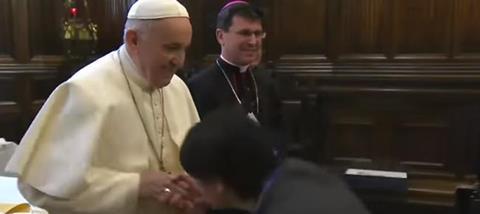
Was it the move of a modernizer –or the gesture of a crotchety old gentleman fed up with fuss?
Footage of Pope Francis pulling his hand away when Catholic pilgrims sought to kiss his ring has not only divided opinion but caused consternation among Catholics.
The above video emerged this week. It shows the pope meeting pilgrims at the Catholic shrine of Loreto in Italy. The decision to pull his hand away left many of the pilgrims visibly confused.
What's going on?
Catholics have traditionally venerated the papal ring – known as the Fisherman’s Ring after St Peter, apostle and fisherman, who is believed by Catholics to have been the first pope - because each holder of the office wears a ring as a sign of his authority. Its origins derive from the days when popes would use a signet ring to seal papal documents but that came to an end in 1842. However, popes continued to wear a ring which was first placed on their hand during their coronation or in recent times, their installation. The ring would then be smashed on the pope’s death as a sign of the end of that papacy; in the case of Pope Benedict XVI, who resigned in 2013, the ring was broken up.
In recent times kissing the Pope’s ring is far from obligatory. When I met Pope Francis in 2016, we shook hands, as did those ahead of me in the receiving line. While others still like to kiss the ring, many others see this veneration as a leftover from the days when the pope was seen as a monarch. Other traditions, also perceived as monarchical, are long gone: in the 1960s Pope Paul VI abandoned the papal tiara, a kind of crown or mitre, and John Paul II got rid of the sedia gestatoria, a portable throne in which the pope used to be carried aloft above the people’s heads. In the days of real flamboyancy, popes would also be surrounded by attendants carrying flabella or white fans of ostrich feathers, but Paul VI let those go too.
It would make sense if Pope Francis decided to put an end to ring-kissing. Ever since he was elected six years ago, he has been keen to live a more modest lifestyle. Rather than be driven about in a limousine he has opted for a small car. He never moved into the ornate apostolic palace, the traditional papal home in the Vatican, and instead lives in the Casa Santa Marta guesthouse.
He is certainly not averse to human contact. During one of the first papal audiences after his election, he embraced a man disfigured with boils, who later said how important the pope’s touch was because most people avoid him. And on Maundy Thursdays during the traditional foot washing ceremony that commemorates Jesus washing the feet of his disciples, Francis has washed the feet of prisoners, Muslims, men and women – all kinds of people. All of these reforms have gone down well with many Catholics, although traditionalists have disapproved. They certainly don’t like this latest apparent reform of Francis.
What has puzzled people, though, is the manner in which Pope Francis rejected those who went to kiss his ring. Footage of earlier on the same day showed him readily accepting the reverence of those who kissed his ring. Then he seemed to become increasingly aggressive in the way he snatched his hand away.
Perhaps the explanation is simple: for a man of 83, he may well have tired of all the kow-towing and the crushing of his fingers by those who meant well but were bruising his elderly flesh. After all, when the Queen has to shake hands with countless individuals, she wears thick, white gloves to protect her fingers. At Buckingham Palace, though, there are plenty of staff to guide visitors and explain what is expected of them. If the Pope had ensured that the pilgrims were told what he wanted, he could have put an end to ring-kissing and not embarrassed the faithful. A little information goes a long way.
Catherine Pepinster is a leading commentator on the Catholic Church, religion, society and the interface between faith and politics. She was editor of The Tablet for 13 years and is a former national newspaper senior executive. She is also the author of The Keys and the Kingdom – the British and the papacy (Bloomsbury).





























